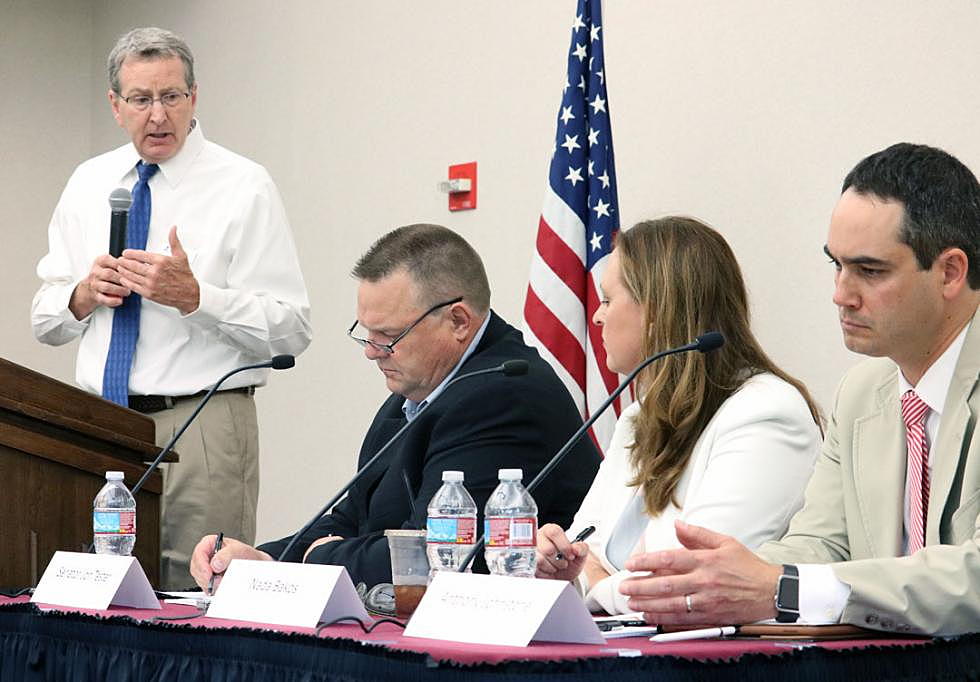
Tester, CIA analyst, law prof: Russian meddling, dark money threaten American democracy
The people's right to vote without being influenced by dark money or a meddling foreign government may stand as the pillar of American democracy, though the nation's electoral system is under attack on both fronts, Sen. Jon Tester said Friday.
Between the U.S. Supreme Court ruling on Citizens United in 2010 and Russian interference in the 2016 presidential race, the nation's electoral process could be at risk if steps aren't taken to safeguard it against anonymous spending and foreign involvement.
“Every Montanan should be concerned about election integrity,” Tester said. “Unfortunately, I believe that integrity is under attack, whether it's the dangerous flow of dark money, whether it's a foreign government meddling in our election, or whether it's making it harder for folks to vote, the integrity of our elections is at stake.”
Tester, D-Montana, joined former CIA analyst Nada Bakos and University of Montana law professor and constitutional expert Anthony Johnstone in a panel discussion Friday aimed at exploring outside influences on the recent U.S. election.
Sen. Steve Daines, R-Montana, was also invited to attend but declined to do so. The event was hosted by the Montana World Affairs Council.
Facing a room of more than 200 people, Tester referenced the 2010 Citizens United ruling, which freed corporations to funnel unlimited amounts of untraceable money into U.S. elections. Critics contend that has given corporations and political action groups the power to skew elections to their own special interests.
In 2012, Tester said, outside groups spent $25 million on Montana's U.S. Senate race. Nationally in 2016, that figure totaled more than $1.5 billion. Tester estimated that his 2018 bid to retain his seat in the Senate could top $75 million.
“Since the Citizens United decision, we've seen the dark money – the money we don't know who it comes from – expand exponentially,” Tester said. “We know money is really not the same things as free speech.”
Tester said Russia's efforts to interfere in U.S elections has emerged as the latest threat, and a very real one at that. While the FBI, CIA and NSA have all agreed that Russia meddled in the 2016 election, President Donald Trump this week raised the prospect that “it could well have been other countries.”
“It's no secret that foreign entities have an interest in disturbing our democracy,” Tester said. “According to the intelligence agencies, the Russian government meddled in the 2016 presidential election. It's not a partisan matter, it's a patriotic one. We cannot allow foreign entities – foreign governments – to influence our elections.”
Tester said he was confident the U.S. Senate Intelligence Committee would get to the bottom of what transpired during the last election. He was also hopeful the investigation would conclude before the end of the year.
Tester said he has spoken with Sens. Richard Burr, R-North Carolina, and Mark Warner, D-Virginia, who serve as chair and vice chair of the committee.
“When they started out the investigation, I was very critical of Mark Warner because I didn't think they were going to get to where they needed to be, because they were playing politics,” Tester said. “I called him up a month ago and said he was doing a great job. They're going to get to the bottom of it and I think that's what's really important.”
While the panel steered clear of presidential politics and separate investigations into Trump, Johnstone said it was the president's job to support and defend the Constitution.
The constitutional expert also suggested that U.S Supreme Court, in its Citizens United ruling, made clear that it was unconstitutional for a government to restrict “disfavored” donors from contributing unlimited funds to a campaign.
If General Motors and Exxon can spend unlimited money to sway the outcome of an election, the same may hold true for “Russian oligarchs,” Johnstone said.
“In their fervor to reach their preordained conclusions on Citizens United, the Supreme Court really had no answer, and it appears to me, it left open the question of whether Russian oligarchs have a First Amendment right to influence our campaigns,” Johnstone said.
While Trump was engaged his his first face-to-face meeting with Russian President Vladimir Putin on Friday, Bokos, a former CIA analyst, said Russia was looking to reestablish its superiority on the world state.
Not since the Cold War has the former Soviet Union enjoyed a global influence, she said.
“Their overarching strategy is expansion and intervention,” Bokos said. “Their tactic right now is to degrade the democratic talking points and go after the mainstream media. They're not necessarily being innovative, but what they're doing is notable because it's influencing the U.S. in a way we haven't seen before.
She added, “They're not focused specifically on Trump or the Republican agenda, they're focused on influencing and interrupting the U.S.”
